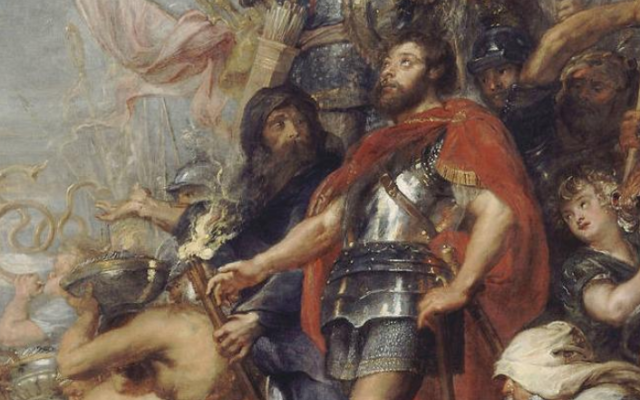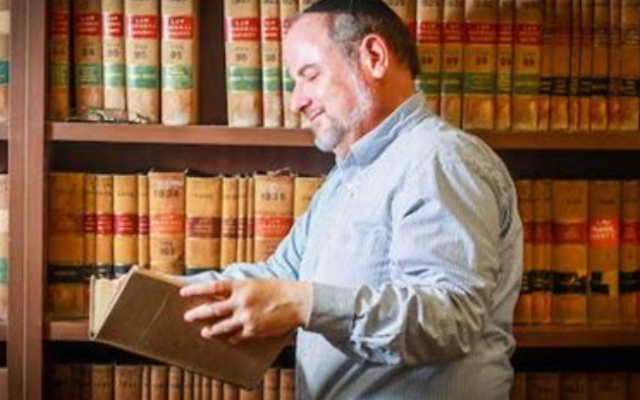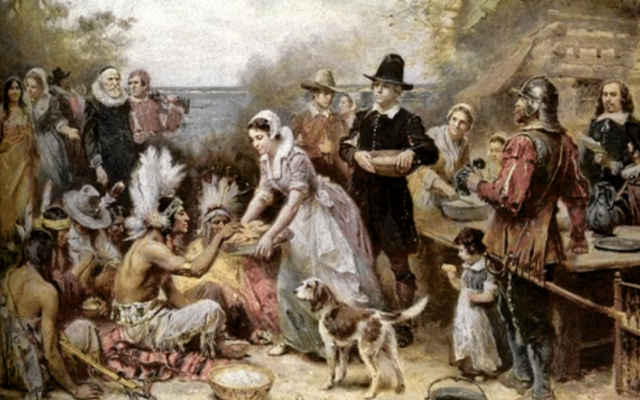The Tangled Traditions of Chanukah and Thanksgiving
According to scholars, both gratitude-based holidays reflect the lasting influence of Sukkot.
The coincidence of Chanukah and Thanksgiving this year calls to mind the similarities of the gratitude-based holidays. Historians and religious scholars suggest that there are good reasons to link the two.
One interpretation of the origins of the historical eight-day Festival of Lights in 139 BCE is that it owes its origins to the observance of Sukkot. According to the Second Book of Maccabees, a letter sent in 125 BCE from the Hasmoneans to the Jews of Egypt describes “the holiday of Sukkot celebrated in the month of Kislev,” which generally falls in November and December. That is unlike the traditional date of Sukkot, which falls in Tishri in September and October.
Since the Hasmonean guerrilla warriors had not yet conquered Jerusalem then, they could not properly celebrate the Temple festival.
According to “A Different Light: The Big Book of Chanukah,” Maccabees II describes the holiday this way: “… the sanctuary was purified on the twenty-fifth of Kislev (Chanukah). The joyful celebration lasted for eight days. It was like Sukkot, for they recalled how only a short time before they had kept the festival while living like animals in the mountains, they observed the joyful celebration, which lasted for eight days. And so they carried lulavim and etrogim and they chanted hymns to God, who had so triumphantly led them to the purification of the Temple.”
Some historians argue that the first Thanksgiving celebration by the Pilgrims who survived the difficult winter of 1608-9 was influenced by their reading of the bible and its traditions of Sukkot, and that they might have come to this recognition through their contact with the Jews of Holland. Just as many Dutch Jews were Sefardim, descendants of the persecuted Jews of Spain, so did the Pilgrims consider themselves the persecuted Protestants of England.

They were certainly familiar with the words of Psalm 136, “Give thanks to G-d for He is good and His love endures forever.”
Nonetheless, the association of Thanksgiving with the Puritans has led scholars like Rabbi Michael Broyde, an expert on Jewish Law at Emory University, to consider whether it is appropriate for Jews to celebrate what some might consider the religious holiday of another faith.
In Canopy Forum, a publication of Emory’s Center for the Study of Law and Religion, he examines the diverse views of three prominent American rabbis. The first, Rabbi Yitzhak Hutner, who was head of a prominent yeshiva in Brooklyn, argues that the holiday grows out of the Christian calendar and is thus prohibited. The second, Rabbi Joseph B. Soloveitchik, argued — much as his father before him — that it was an American holiday and part of being a good American, and that “technical Jewish law permitted it.”
The last set of opinions belong to Rabbi Moshe Feinstein, who was, “without a doubt the greatest Jewish law scholar in the United States.” Rabbi Feinstein wrote four published responsa, or opinions, related to Thanksgiving, which he said was permissible, so long as the celebration remains secular.
“Thus, it is obvious in my opinion, that even in a case where something would be considered a prohibited Gentile custom, if many people do it for reasons unrelated to their religion or law, but rather because it is pleasurable to them, there is no prohibition of imitating Gentile custom. So too, it is obvious that if Gentiles were to make a religious law to eat a particular item that is good to eat, Jewish Law would not prohibit eating that item.”
In the original Thanksgiving story, the Pilgrims supposedly feasted with 90 Wampanoag Indians who had helped them with their crops and taught them how to fish and survive off the land.

As Moshe Sokolow, a professor of Jewish education at Yeshiva University, has described it, the Pilgrims who arrived on the Mayflower brought with them a Bible annotated by Puritan scholar Henry Ainsworth, which in a reading of Psalm 107 speaks of surviving the threat of catastrophe.
As Sokolow relates, the Puritan teacher “essentially copied over an English version of Maimonides’s comprehensive legal code, the Mishnah Torah, Hilkhot Berakhot, which describes how one is to give thanks.”
In their prayer service, created immediately after their arrival on the shores of what would later become the State of Massachusetts, the Pilgrims anticipated by a full year the initial occasion for our national holiday.
- Bob Bahr
- Chanukah
- Community
- Thanksgiving
- Rabbi Michael Broyde
- Emory University
- Jewish law
- Pilgrims
- Sukkot
- lulavim
- etrogim
- Books of the Maccabees
- Festival of Lights
- Hasmonean guerrilla warriors
- Temple Festival
- Jerusalem
- A Different Light: The Big Book of Chanukah
- Bible
- Jews of Holland
- Jews of Spain
- Protestants of England
- Sefardim
- Canopy Forum
- Moshe Sokolow
- Emory’s Center for the Study of Law and Religion
- Rabbi Yitzhak Hutner
- State of Massachusetts
- Rabbi Joseph B. Soloveitchik
- Henry Ainsworth
- Hilkhot Berakhot
- Rabbi Moshe Feinstein
- Wampanoag Indians
- Mayflower
- Yeshiva University




comments